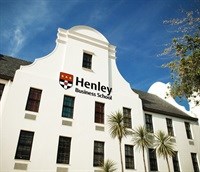
Top stories






More news


Marketing & Media
Ads are coming to AI. Does that really have to be such a bad thing?














Mr South Africa has been crowning male role models for a number of years, and boasts well-known personalities such as Dr Michael Mol, Adrian Bergh, Andrew Govender and Stephen Segel as previous winners. The brand has certainly come a long way in its 22-year history and this year it has been working to elevate the Mr South Africa competition to another level, by challenging the contestants to effect change in various areas of society.
"At Henley our mission is to empower individuals to become great professionals and outstanding leaders who think with clarity and act with confidence and conviction," says Jon Foster-Pedley, Dean and Director of Henley Business School Africa. "We enable people to better understand themselves and their responsibilities to society, while at the same time blending the practice and theories of successful business. Simply put we build the people, who build the businesses that build Africa - aims that the Mr South Africa brand is also working towards.
"It has been a hugely worthwhile exercise to expose the Mr South Africa contestants to the world of business through these executive coaching sessions and I believe the time spent with us has provided them with an excellent introduction to the open-ended future that lies ahead."
The Henley Business School coaching that was sponsored was carried out by Danny Tuckwood, a Henley-registered executive coach specialising in leadership development, who has completed the international Henley MSc in coaching. Each 90-minute, one-on-one session identified an area of each contestant's life that either needed improvement or further development. The sessions were characterised by robust conversations that quickly got to the heart of the matter and highlighted issues around specific behaviour. The coach then facilitated the development of concrete actions to be taken in pursuit of the desired outcomes.
"Coaching empowers people to identify their blind spots, development areas or situations where strengths have potentially been overplayed and to develop a range of alternative choices, behaviours and ways of thinking that may fit better with a desired outcome," Tuckwood explains.
Speaking on behalf of the contestants, Ditiro Roantlane says the executive coaching sessions were invaluable in bringing understanding and focus to the personal challenges encountered in the world of business.
"We're honoured to have received such high quality coaching from the world-renowned business school that Henley is," he comments. "This was a wonderful opportunity to gain exciting and invaluable insight into the world of executive leadership and it has certainly created a stepping stone to help us have a greater impact on Africa."
Founded in 1946, Henley Business School was the first business school to be established in Europe and has since built a pedigree of outstanding educational programmes for business and the public sector, repeatedly being recognised worldwide in international rankings for its quality of students and breadth of alumni. Henley Business School has been in Africa for 24 years and is the only international business school accredited in South Africa by the Council on Higher Education. Henley is also one of only 57 business schools in the world, and one of three in Africa, to hold triple-accredited status from the world's leading business school accreditation bodies, the Association of MBAs (AMBA) in the UK, the European Quality Improvement System (EQUIS) and the Association to Advance Collegiate Schools of Business (AACSB) in the USA.